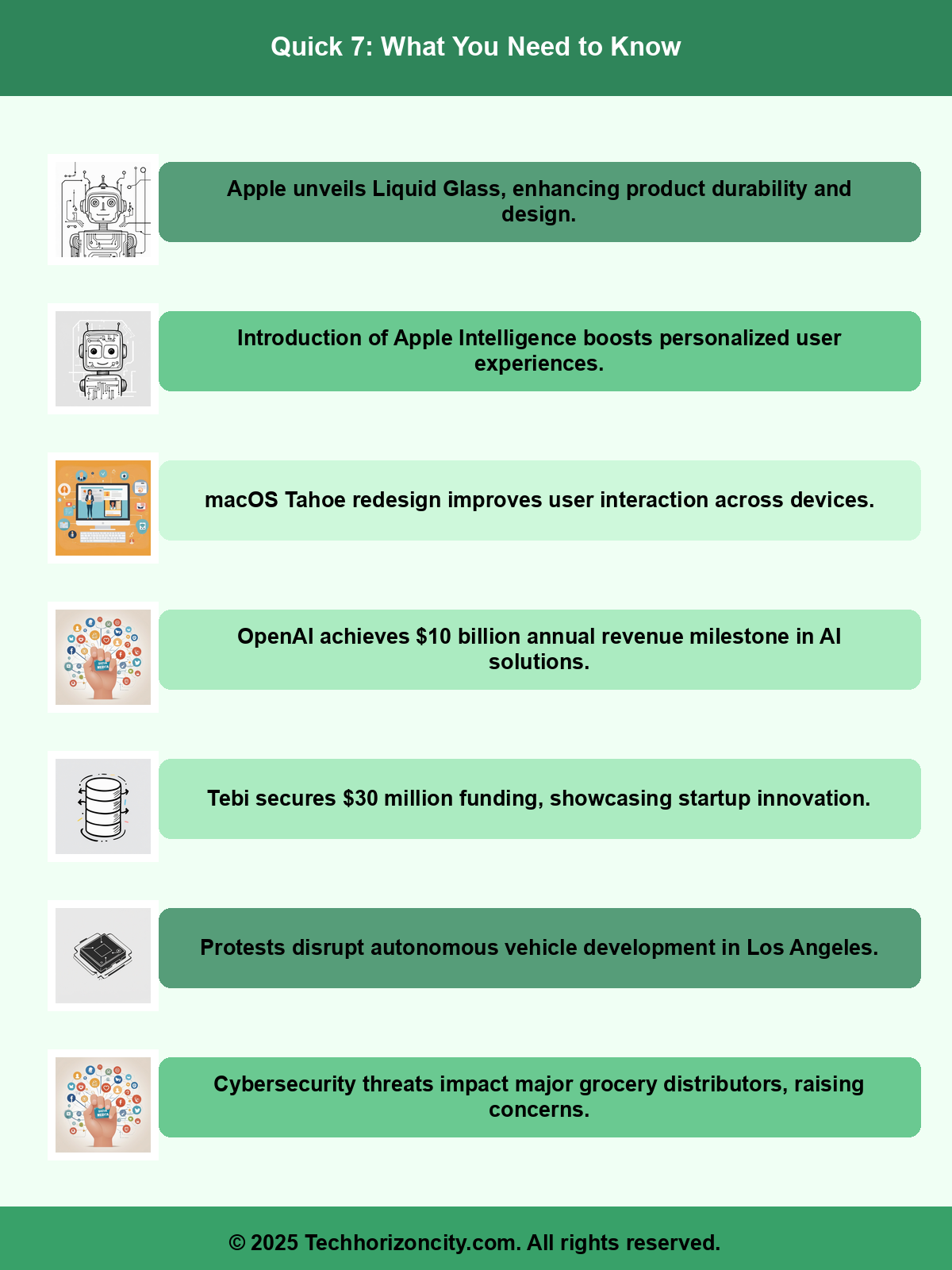Executive Summary
The tech world is buzzing following the recent WWDC 2025, where Apple unveiled groundbreaking innovations such as Liquid Glass and the highly anticipated Apple Intelligence. These advancements, coupled with a complete redesign of their operating systems, indicate Apple’s commitment to maintaining its market dominance. Meanwhile, other players in the tech arena, like OpenAI and startups such as Tebi, are making headlines with significant financial milestones and investments. However, the industry is not without its challenges, as highlighted by recent protests affecting autonomous vehicles in Los Angeles and cybersecurity threats impacting major grocery distributors. Together, these elements paint a dynamic picture of the evolving tech landscape.

Background Context
WWDC, Apple’s annual Worldwide Developers Conference, is traditionally a platform for the company to showcase software updates and innovative technologies. This year, the introduction of macOS Tahoe and the reintroduction of tabs in the Photos app on iOS 26 have garnered significant attention. These enhancements aim to streamline user experience and elevate interactions across devices. Liquid Glass, a new material touted for its versatility and durability, hints at Apple’s focus on tactile and responsive design. Alongside this, the launch of Apple Intelligence, a sophisticated AI framework, positions the company to compete directly with tech giants like Google and OpenAI.
On the other side of the spectrum, OpenAI’s reported annual revenue of $10 billion signifies a monumental leap for AI-driven solutions. The growing reliance on AI tools and services across various sectors has underscored the importance of ethical frameworks and responsible deployment. Meanwhile, Tebi, a startup founded by a former Adyen cofounder, successfully secured $30 million in funding from Alphabet’s CapitalG, reinforcing the belief that innovation still thrives amidst economic uncertainties.
Analysis of Implications
The updates unveiled by Apple signify more than just hardware and software enhancements; they reflect a larger strategy aimed at user engagement and brand loyalty. With Liquid Glass set to revolutionize product design, we may see a shift in consumer expectations regarding durability and aesthetics in tech devices. Furthermore, the introduction of Apple Intelligence suggests a pivot towards more personalized user experiences, as the company seeks to harness AI capabilities in ways that could redefine how users interact with their devices.
In contrast, the reported revenue increase for OpenAI illustrates the growing appetite for AI solutions across industries. The $10 billion figure not only highlights the financial viability of AI but also raises questions about the long-term implications of such rapid growth. As more organizations integrate AI, the demand for transparency and ethical considerations in AI deployment becomes increasingly critical. This shift could prompt regulatory changes and a reevaluation of how technology companies operate.
Industry Impact Assessment
The recent protests in Los Angeles, resulting in damage to Waymo robotaxis and Lime e-scooters, underscore a growing tension between technological advancement and public sentiment. As autonomous vehicles become more prevalent, resistance from communities may lead to stricter regulations and a slower adoption rate. This could hinder progress for companies aiming to revolutionize transportation through automation. The tech industry must navigate these complexities and engage with communities to build trust and foster acceptance of new technologies.
Additionally, the recent cyberattack affecting a major US grocery distributor reveals vulnerabilities within the digital infrastructure of essential services. Such incidents not only disrupt operations but also erode consumer confidence. Companies must invest in robust cybersecurity measures to safeguard against potential threats, as public trust in technology is paramount for continued growth and acceptance.
Future Outlook
Looking ahead, the tech landscape will continue to be shaped by the interplay between innovation, ethical considerations, and societal acceptance. Apple’s focus on integrating AI and advanced materials suggests that we may see more hybrid products that prioritize functionality and user experience. Companies that can successfully navigate this balance will likely emerge as market leaders.
Furthermore, as OpenAI and startups like Tebi demonstrate, the AI sector is poised for exponential growth, but it must also contend with regulatory scrutiny as the implications of AI technologies become more pronounced. The industry’s future will depend on how stakeholders address concerns surrounding privacy, security, and ethical AI deployment.
Conclusion with Key Takeaways
The announcements from WWDC 2025 and the concurrent developments in AI and startup ecosystems mark a pivotal moment for the tech industry. Apple’s innovations, alongside the financial successes of companies like OpenAI and Tebi, demonstrate a vibrant and competitive landscape. However, the challenges posed by social unrest and cybersecurity threats remind us that technological advancement must go hand in hand with societal responsibility.
Key takeaways include:
- Apple’s bold innovations aim to redefine user engagement and experience.
- OpenAI’s revenue highlights the growing importance of AI across sectors, necessitating ethical considerations.
- Community acceptance of technology is crucial, especially in the face of resistance to autonomous vehicles.
- Cybersecurity threats are increasingly relevant, requiring proactive measures from all stakeholders.
The coming years will be critical in determining how these factors shape the future of technology and its integration into everyday life.
Disclaimer: This article was independently created based on publicly available information and industry analysis. While inspired by developments reported at techcrunch.com, all content, analysis, and opinions expressed are original and do not reproduce copyrighted material.
For the original reporting, please visit: https://techcrunch.com/
